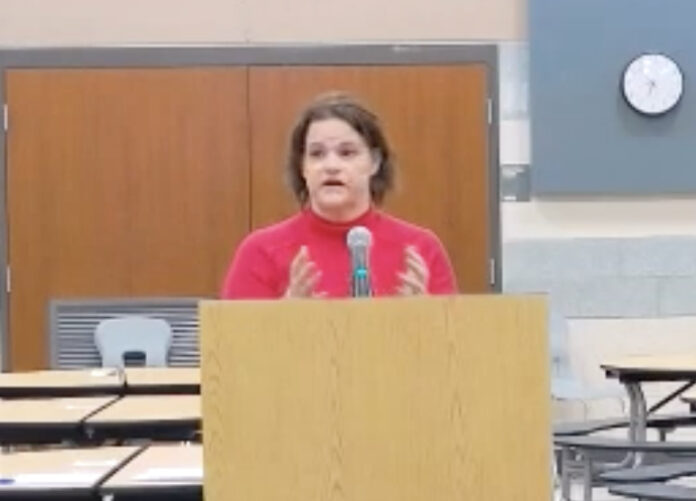NORTH SMITHFIELD – A questionnaire used to assess and document adolescent health risks will have two less questions than usual when it’s filled out by North Smithfield students this year in effort curb parent concerns with past efforts to collect the data.
The School Committee voted unanimously this week to allow the Rhode Island Department of Behavioral Health to administer its 2024 Student Survey, following an hour and 20 minute discussion on the necessity and purpose of the questionnaire – and some changes to how it will ultimately be administered in the district.
According to the vote, questions asking students about their gender identity and sexual orientation will be removed from the online form, used in schools across Rhode Island to document the prevalence of high-risk behaviors such as vaping, drugs and alcohol use. And rather than starting with 6th graders, it will be parents of 8th through 12th graders in town who have the option to opt out of having their child participate in the anonymous questionnaire.

“I just don’t want a parent to come back and say, ‘don’t ask my 6th graders these questions,'” said School Committee Chairman James Lombardi.
Committee member Margaret Votta recused herself from a vote on the issue on Tuesday, Jan. 23, a move that follows blowback over her input on a previous survey administered in 2021. A group of more than 150 residents signed a petition calling for Votta’s resignation from the committee that year, saying her job as research specialist for the Rhode Island Department of Education presented a conflict of interest.
The survey, administered through University of Rhode Island, has been filled out by students across Rhode Island every other year since it was launched in 2016. In seeking approval for the project this week, Andrea Paiva, a teacher at URI, noted that all questions are always optional.
“The main reason for completing it is grant funding,” said Paiva. “That can really fund any prevention work.”
Paiva noted that new questions regarding cell phone use and gambling have been added to this year’s form, typically filled out online by students during a single period of health class. Participation qualifies the town for grants used to bring prevention-focused resources to the schools, such as speakers, student counselors and teacher training.
Committee member Terri Bartomioli said she would prefer if the parents were asked to opt in, rather than decline participation.
“I know the reaction that came out of this town two years ago, so I’m not comfortable with it,” Bartomioli said. “Why is this not done through the pediatrician’s office?”
Paiva noted that schools reach a wider segment of youth, and at least 60 percent from each grade level must participate for the data to be usable.
“We will never collect enough data if it’s opt in. We have tried that,” Paiva said. “Parents are busy.”
“If a grade does not reach that 60 percent threshold, than they’re not reported at all,” Paiva added. “There’s no school system that would be able to put $125,000 into substance use and mental health alone.”
Committee Vice Chairperson Jean Meo took the opposite stance, citing her work on the district’s Health & Wellness Subcommittee.
“All of the information you can gather in this day and age is necessary,” said Meo. “I can’t quite understand why they would not do this, because I think the data collected is extremely important.”
Paiva noted that the information is used to prove need for prevention-focused funding, as well as potentially to educate parents about some of the things today’s students are facing.
Both Lombardi and Bartomioli questioned the inclusion of some questions that they noted were not related to substance use.
“Some of the questions, I’m like, ‘why?'” Lombardi said. “I just don’t know if we should be doing it. My concern is: are children uncomfortable?”
“I think they’re going to say, ‘hold up, now you’re bringing something into the school that shouldn’t be,'” Bartomioli said of parents, regarding the sexual orientation and gender identity questions. “I don’t know if they’ll be comfortable that that’s part of it.”

“Maybe that’s not part of what you need,” Bartomioli said to Paiva of the data.
“The reality is, those are not the key questions that we care about,” Paiva replied.
Bartomioli made the motion to exclude the questions, along with students in grades 6 and 7 from the questionnaire, also moving that the complete survey itself should be included with the opt-out form for parents.
“I prefer to keep the questions in and let people opt out of it but if it will help move the process along I’m willing to go along with this motion,” said Committee member William Connell.
All agreed the district should publicize the effort in as many ways as possible.
Supt. Michael St. Jean said the survey is unlikely to reveal anything educators don’t already know.
“Believe me, it’s out there. It’s prevalent,” St. Jean said of substance use. “The data would be good.”








Sounds like most of the school board is going with the ‘expedient’ option rather than one of the ‘science-based’ or ‘reality-based’ options. The path of least resistance is rarely the best route to take.